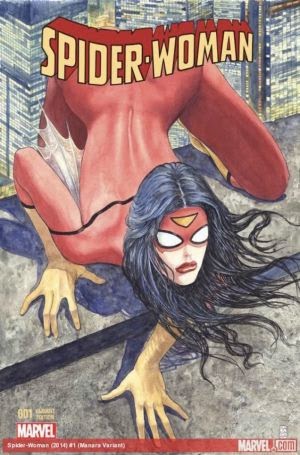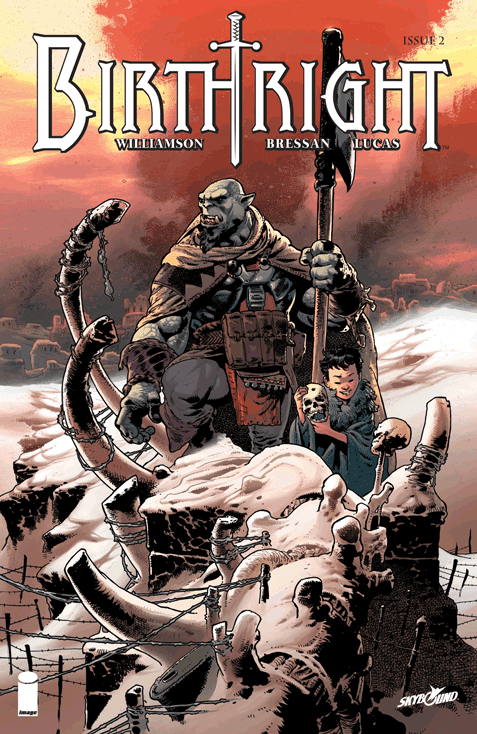 |
| Alex + Ada #10 |
There are some key turning points in this issue, as Alex receives a visit from an old girlfriend and finds resolution to their relationship. At least one person walks away unhappy. How will he relate to Ada after that? The ending is what readers have been waiting for since issue #1, with a final page plot point that moves the story into its next phase. Excellent. Every issue of A+A is a treat.
Rating: ***** out of 5 stars.
 |
| The Kitchen #1 |
 |
| Interior page from The Kitchen |
Rating: *** out of 5 stars
 |
| Grendel vs. The Shadow #3 |
In the end all the toys are put back in place, but Grendel vs. The Shadow is a brilliant, pulpy look at what might have been. Highly recommended.
Rating: ***** out of 5 stars
 |
| The Fade Out #3 |
The Fade Out is good, and manages to stand out just fine in a sea of duller comics. Only being on issue three, I hope it eventually manages to amaze as much as Brubaker/Phillips stories usually do.
Rating: *** out of 5 stars
 |
| Spider-Woman #1 |
 |
| Censored Variant Cover |
Rating: ** out of 5 stars (for Greg Land’s artwork)
 |
| Winterworld #4 |
Rating: **** out of 5 stars
 |
| Birthright #2 |
In bits and pieces, it is revealed that Mikey has been raised and trained as the chosen warrior in a fantasy world, where time passes differently, fighting the usual evil monsters. He says he returned to Earth because the evil he defeated in the other world now threatens to destroy us. In police custody, Mikey pleads with Brennan and his parents to believe him and welcome him back. When the fingerprints come back proving the stranger is Mikey, everyone has some big decisions to make.
While I hate to ruin the main twist in the story, I would like to give people a reason why this book is different. Let’s just say ... while Mikey is being honest about who he is, he may not be telling the truth about what happened in the other world. And he may not be working for the good guys ... Birthright is a fresh look at some traditional fantasy ideas from a welcome yet skewed point of view. I can’t wait to see where this goes.
Rating: ***** out of 5 stars
 |
| Weird Love #4 |
- Too Fat to Frug (Love Diary #47, 1967). I think this story boils the mad, mod ‘60s down to their patchouli-scented essence. Life was wonderful for Sharon Carr, the go-to Cage Queen at the local discotheque. Until she met Bus Wayne, the new Beatle-esque band singer. She falls quickly and hard for Bus, but is mortified when he takes a side glance at the new singer Sheila. Yup, that’s right, Bus didn’t try to break it off with Sharon or express any desire to date Sheila, he just gave her a sidelong glance. This is enough to make the volatile Sharon give the Bus a good slap and shout “Casanova!” at the top of her lungs. To quote Inigo Montoya, “I don’t think that word means what you think it means.” Immediately sorry for her minor overreaction (ah-hem) Sharon drowns her lonely sorrows in fried foods, ice cream, and fried ice cream. When Sharon goes to the doctor for help losing her new folds of fat, he tells her, “I’m sorry, Sharon, there’s nothing I can do for you! Your glands have been disturbed by your over-eating! I’m afraid you’ll be this way for the rest of your life!” To which Sharon replies, “OOOhh NOOO!” Really, what else is she going to say? Thanks for the true and accurate medical advice, Dr. Mengele. Distraught, the now morbidly obese Sharon makes her peace with losing Bus, continues her strict Ho-Ho diet, and finds a fat guy to date. Really. That’s how it ends. The ‘60s, ladies and gentlemen! I’m still not sure what “frugging” is.
- I Was a Border Racket Girl (Sweethearts #107, 1952). Amy is poor and wants more out of life. Her pal Dot turns her on to the Border Racket—marrying foreigners who want to get into the U.S. for some easy cash! They come to the U.S., then get a divorce a few months later and Dot goes back for the next
- Flirtation on Wheels (Teen-Age Temptations #4, 1953). Pam is too ashamed to live, as she should be. She is the lowest form of life—a trailer park girl! Because her father is a freelance engineer, they must uproot regularly and go from town to town in—a trailer! Pam quickly gets the message from other kids in her various schools—you’re trailer trash! The only type of man to pay attention to her is her latest scummy neighbor, Don. When she meets rich boy Adam, she pretends to be the granddaughter of the richest lady in town. After their dates, Adam drops her off at the gates of the richie mansion, and poor Amy has to hoof it home on her own! But how can she tell Adam she’s ... trailer trash? When Adam finds the truth, which he’s known from the beginning since he’s the grandson of the richest woman in town and he’s not dating his sister, he’s okay with slumming a bit. But Pam is so ashamed—thinking Adam will reject her, she runs straight into Don’s arms. Avoid the lit cigarette, Pam! And the cheap Vodka breath! Will our lovebirds find happiness? I’m sure they will, these things always work out, don’t they?
Other stories in this issue include “Two Faced Woman,” about a man who likes ugly women, and “A Monster’s Kisses,” about a new bride who loses it over the fact her husband won’t shave every day on their honeymoon. There are also some priceless one-page features, such as “Men You Shouldn’t Marry” and “Love Dancing.” Weird Love is a perverse, subversive commentary on American romance, and should be banned from all decent and law-abiding homes. How I love it!
No comments:
Post a Comment